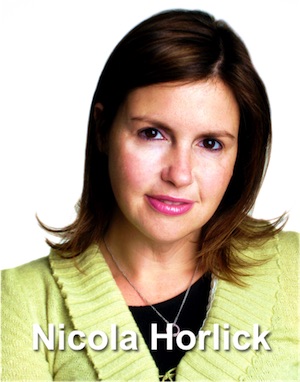Are top managers stuck being either corporate or entrepreneurial?
Or can they switch from one domain to the other?
These questions are often asked – not least in competitive TV business shows like The Apprentice (certainly here in the UK, with Lord Sugar at the helm).
Nicola Horlick is an example of a highly paid corporate executive who left that world and started a series of her own businesses. Let’s see what we can learn from her story.
Short Biography
Nicola Gayford was born in 1960 in Nottingham (England) and grew up in Wirral, Cheshire. She studied Law at Oxford University (where she met future first husband Timothy Horlick), graduating in 1982. After a year working in the family business, she went to London to join the Mercury Asset Management part of merchant bank SG Warburg, as a graduate trainee.
She did well, and in 1989, she was made a director. Two years later, she moved to Morgan Grenfell Asset Management, where she became Managing Director in 1992. From then to 1997, she grew the assets under management from £4billion to £18billion (around US$6 to 28 billion).
Then, in 1997, she was accused of planning to move to a rival firm and poach many of her team. Morgan Grenfell suspended Horlick and, despite a high profile meeting with the bank’s parent institution, Deutsche Bank, she left the business.
Horlick pretty quickly set up SG Asset Management and has been a serial business starter ever since. In 1998, though, she also had to cope with the death, from leukaemia, of her oldest child, daughter Georgina.
We don’t need to go into the details of all of her businesses, but it is instructive to summarise.
- SG Asset Management – established 1997, Horlick sold out her shares after a dispute with an investor in 2003.
- Bramdean Asset Management – formed in 2004, focuses on alternative assets.
- Rockpool Investments – formed in 2011, focuses on private equity
- Georgina’s – a restaurant/bistro, formed in 2012. Closed through poor trading in late 2014
- Glentham Capital – formed in 2013, specialises in funding films
- Money & Co – formed in 2013, is a web-based intermediary for crowdfunding small and medium sized businesses
What do we Learn about the Transition from Corporate Manager to Entrepreneur?
We cannot of course generalise from one specific case, but three things seem to me to be instrumental in Horlick’s successes:
- She was successful when she started businesses in areas of her own expertise. Her one ‘vanity project’ (my words not hers) of a restaurant failed. I suspect this was partly due to lack of focus (she was running other high maintenance financial businesses at the same time) and largely due to not knowing enough about the restaurant business. It was a toxic mix of thinking you know more than you do (we all eat at restaurants, so we are all experts), not giving it the priority it needs, for you to learn, and possibly not needing it badly enough (she had other profitable businesses).
- She has phenomenal energy and drive. Not for nothing, many of the UK newspapers and magazines called her a Superwoman, juggling high pressure jobs with being a mum to a large family. If you are going to start a business, you need a lot of commitment and energy.
- She had a big chunk of cash behind her when she started her own businesses, from a considerable period of very high salaries from senior roles at prestigious City of London financial institutions. Big money can smooth out big bumps in the road.
So my conclusion – a purely personal point of view – is that an entrepreneurial mindset is different from a corporate one. It is of course possible to have both, but in Horlick’s case, her entrepreneurship was far from the ‘start from zero resources and low knowledge’ model of the stereotypical rags-to-riches entrepreneur. She approached entrepreneurship in a corporate manner: with deep expertise and a big resource base.
Is Nicola Horlick a Superwoman?
Maybe. But first and foremost, she is an asset manager.

